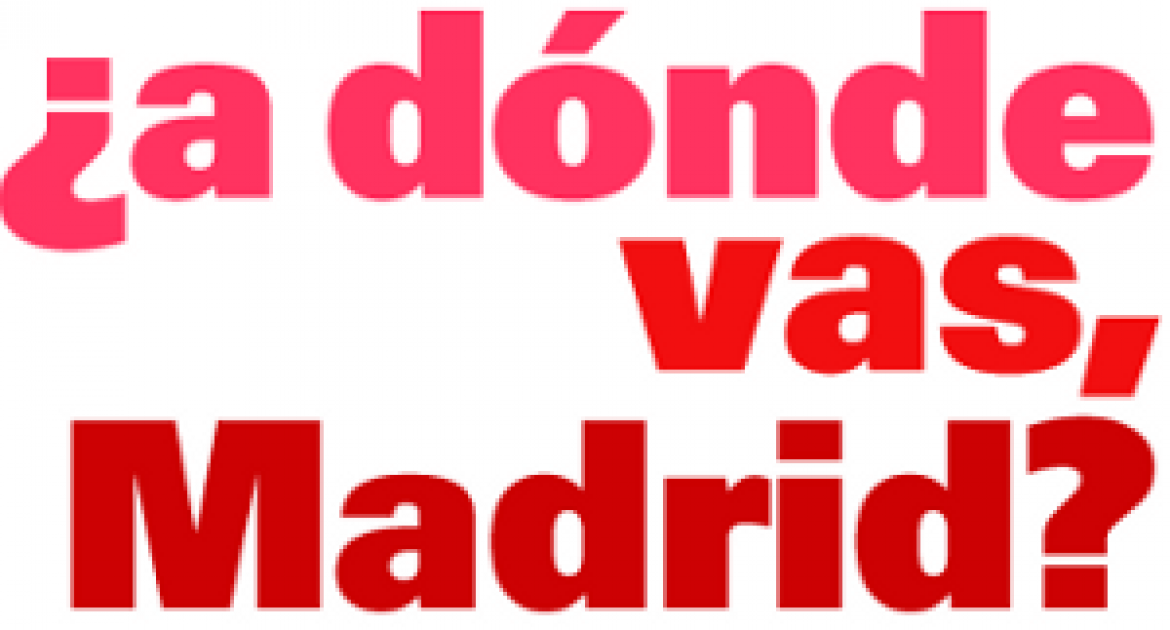¿A dónde vas, Madrid? e-ciudades and Cultural Politics in Madrid

Our society, economy and culture are built upon interests, values, institutions and systems of representation that in general terms limit creativity, confiscate and manipulate the artist’s work and divert his energy towards a sterile confrontation and discouragement. Interested in revealing the configurations of power, the practice of art must establish social relationship mechanisms that help to ensure its long-term impact and enable it to take its discourse beyond the restricted confines of art-lovers and the institution itself.
In an attempt to offer alternatives of action, to open up spaces for confrontation and for the critique of a vision that is too restricted, with a one-dimensional, excessively hierarchical, instrumentalised and remote-controlled vision of the world that surrounds us, Technologies To The People was presented in late 2001 with the design and implantation of a series of internet platforms for discussing cultural policies, the first being e-valencia.org. The internet is indissolubly linked to the processes of structural change and the fundamental transformation taking place in our society furthermore, it is undoubtedly modifying the way we think, relate to one another, consume, produce and trade. In conclusion, the internet is transforming all of the activities that we undertake.
These e-projects are platforms that approach and question society’s capacity for self-regulation in contexts of discussion and critique when the mechanisms for social control and the regulations imposed by traditional means are de-activated. This is a tool destined for collective use and to be implanted locally. Its aim is to be able to exert an influence in certain contexts through the force created by the collective involvement of numerous individual mechanisms, by people or by collectives that are dispersed yet which have the capacity to operate, speculate and develop a level of collective knowledge. The internet’s digital space did not simply emerge as a means of enabling communication, as the public forum that it undoubtedly is. It also emerged as a new theatre for operations defined by social and power relationships. And it is undoubtedly a space where other actors can acquire visibility. In the global economy any organisation, however small its fraction of representation within the structure, can have a decisive influence in the global community by efficiently using the tools and resources offered by the new information and communications technologies.
Thus is born e-sevilla.org, as in their time were e-valencia, e-barcelona, as well as a long list of platforms that have been developed by, or that have emerged from, social processes or practical workshops such as e-seoul, e-wac, e-saopaulo, etc. Seeking the social participation of collectives, and local movements involved in critical processes concerning cultural policies and processes; generating new dynamics, breaking control mechanisms. A forum as the response to the growing instrumentalistion of public processes and for open, transparent discussion. Giving a voice to that which is not a voice, giving a voice to cutting criticism and expressive language. Some with more justification than others. Some with better manners than others. Some more morally demanding than others. Such forums are more than what we usually hear or read in other media. Always pushing the limits.
Program
Wednesday, October 6:
5 pm to 8 pm: Presentaction of different e-ciudades:
+ e-valencia
+ e-norte
+ e-sevilla
+ e-barcelona
+ e-madrid
+ e-ciudadreal
Debate about the model or models of e-ciudad [+info]
Thursday, October 7:
11 am to 2 pm: Hiperlocal media in twitter era (I)
Workshop about hiperlocal media, and citizen and cultural journalism in Madrid. How do they work in a technical and managing way. Editing aspects and new selection. Scale and scope of the information. No registration required. [+info]
16:00h a 21:00h: ¿A dónde vas, Madrid? Debate about cultural politics in Madrid.Table 1. Public and semipublic institutions
* Juan Carrete (Intermediæ and Medialab-Prado)
* Frank Buschmann and María Bella (Intermediæ)
* Marcos García (Medialab-Prado)
* Pablo Berástegui (Matadero Madrid)
* César Rendueles (Círculo de Bellas Artes)
* Álvaro Matías (PhotoEspaña)
* Ariadna Cantís (Fresh Madrid, Arquitectura emergente)
Table 2. Private and citizen institutions
* Lucía Casani (La Casa Encendida)
* Alberto Anaut (La Fábrica)
* Jordi Claramonte (C.S.A. La Tabacalera)
* Javier Duero (Pensart Cultura)
* Nieves Correa (Agentes Artísticos Independientes de Madrid, AAIM)
* Ánder Azpiri (Artistas Visuales Asociados de Madrid, AVAM)
* Raúl Sánchez Cedillo (Universidad Nómada, Atravesad*s por la cultura)
* Mar Núñez (Kultur-o-meter)
Representatives of different cultural institutions talk about their work from three perspectives: budget, management (internal organization, goals...) and networking (relationships with other institutions). [+info]
Friday, October 8:
10 am to 2 pm: Hiperlocal media in twitter era (II)
Workshop about howo to create an e-ciudad, technical skills and how to become a member of the e-madrid community. [+info]



 Medialab-Matadero Madrid
Medialab-Matadero Madrid